Online Time Table
| Day | Time | Class |
|---|---|---|
| Tuesday | 10am UK | Community of Practice |
| Wednesday | 9am UK | Certified Recovery Coach |
| Thursday | 10am UK | LERO - Peer Recovery Specialist |
| Thursday | 2pm UK | Systemic Wellness Practitioner |
| Friday | 12pm UK | Case Manager |

Your Path to Becoming a Certified Recovery Coach
Take the first steps towards becoming a certified MAUNI Recovery Coach
Welcome to the Mauni Digital Campus.
At Mauni Coaching Campus, we don’t just hand out certificates — we build leaders in recovery and wellness.
Our Certification Path is designed to meet you exactly where you are and walk with you all the way to mastery.
Peer Recovery & Recovery Coach."
1. Start: Core Recovery Coach Training
Foundations: Learn the essentials — coaching skills, recovery principles, ethics, and the Mauni approach.
Certification: Become a Certified Recovery Coach (ISO17024 aligned).
"You don’t need to be perfect to start. You just need to start."
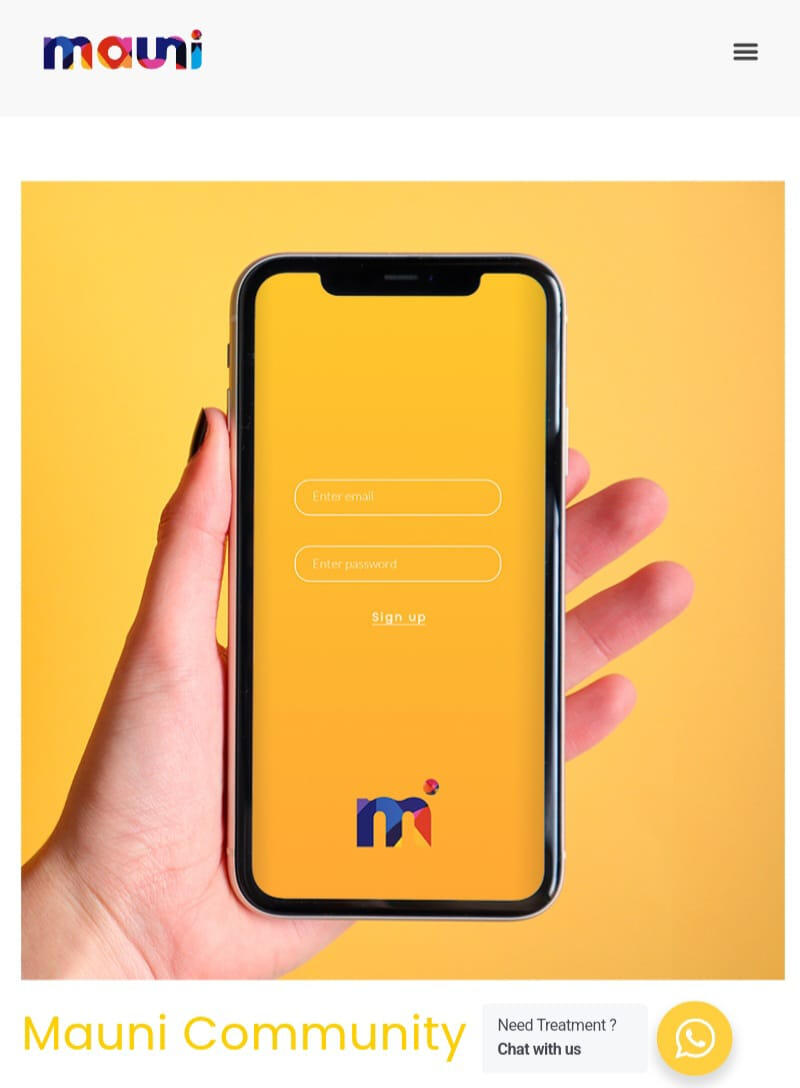

Systemic Wellness Practitioner
2. Grow: Advanced Coaching Pathways
Once you’re certified, you can deepen your skills with optional specialist tracks:
Executive Recovery Coaching (for leaders and professionals)
Wellness Recovery Coaching (for broader mental health support)
Systemic Wellness Practitioner Training (to work with groups, communities, and organizations)
Each track helps you carve out your niche and find your unique voice as a coach.
Case Manager and Facilitator Training
3. Lead: Master Certification
After completing your training and gaining experience, you can move toward Case Manager, Facilitator or Master Recovery Coach certification.
This includes leadership development, mentorship opportunities, and supporting the next generation of coaches.
"Leadership isn’t a title. It’s an action. It’s a way of living."
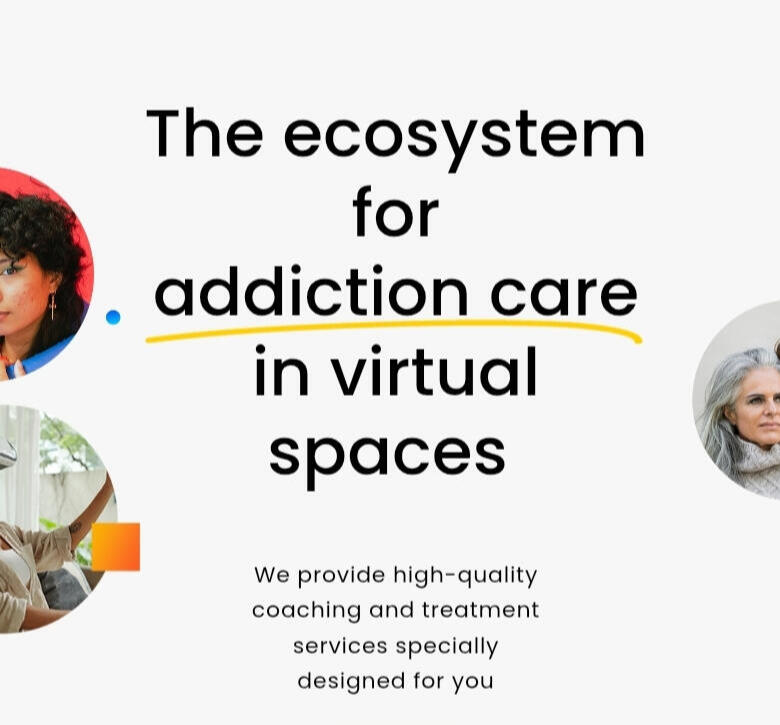
Why Mauni?
✅ Internationally accredited (ISO17024 compliant)
✅ Blend of Western science and African wisdom
✅ Hands-on experience, real-world application
✅ Supportive global coaching community
✅ Ethical, inclusive, and people-first
We believe coaching is not about fixing people — it’s about walking beside them while they rediscover their own power.
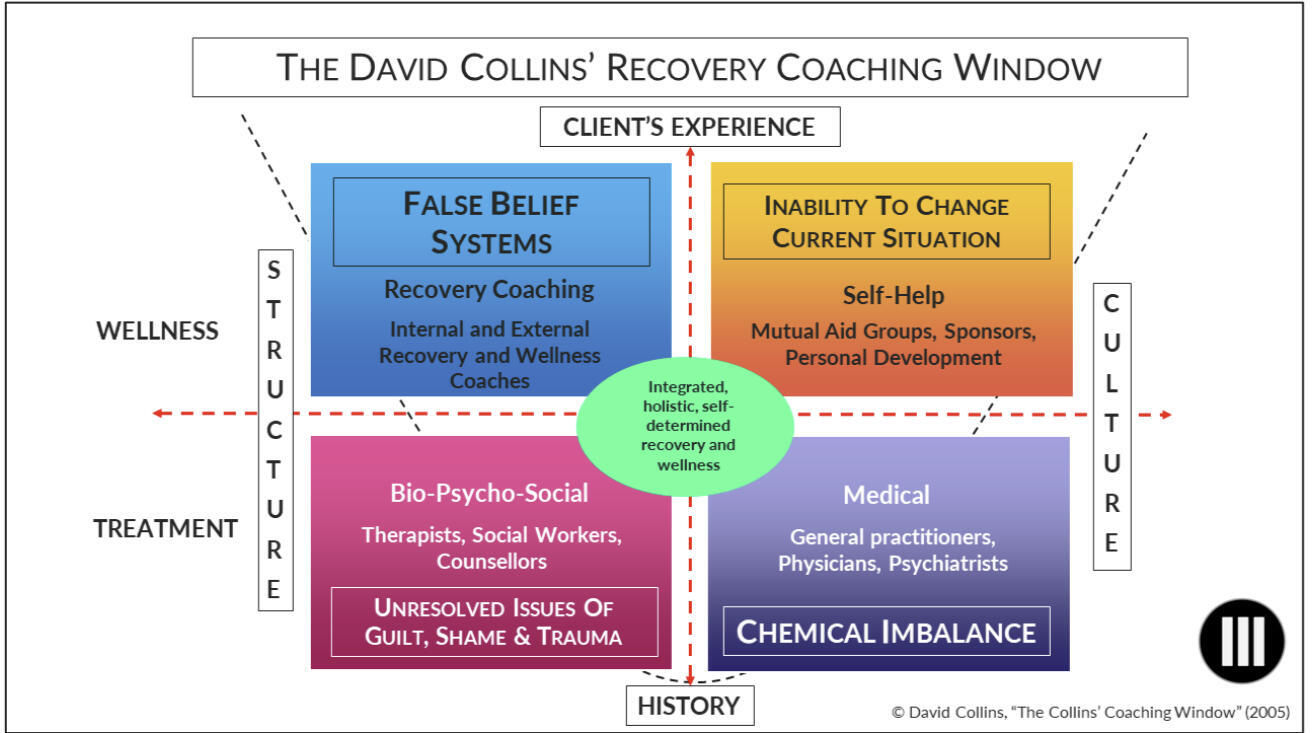
The David Collins Recovery Coaching Window – Reference DocumentOverview:
The David Collins Recovery Coaching Window is a systemic coaching model developed by David Collins to help coaches understand where recovery coaching fits within the broader recovery and wellness ecosystem. It distinguishes between treatment and wellness approaches, as well as structure and culture, to define the unique contribution of recovery coaching.Purpose:
This window is a teaching, supervision, and ethical tool for CPRC trainees and facilitators. It encourages systemic thinking and clear boundary management, and supports ethical, culturally aware practice.Created by: David Collins (2005)Used in: Certified Professional Recovery Coach (CPRC) Training at Mauni Coaching Campus
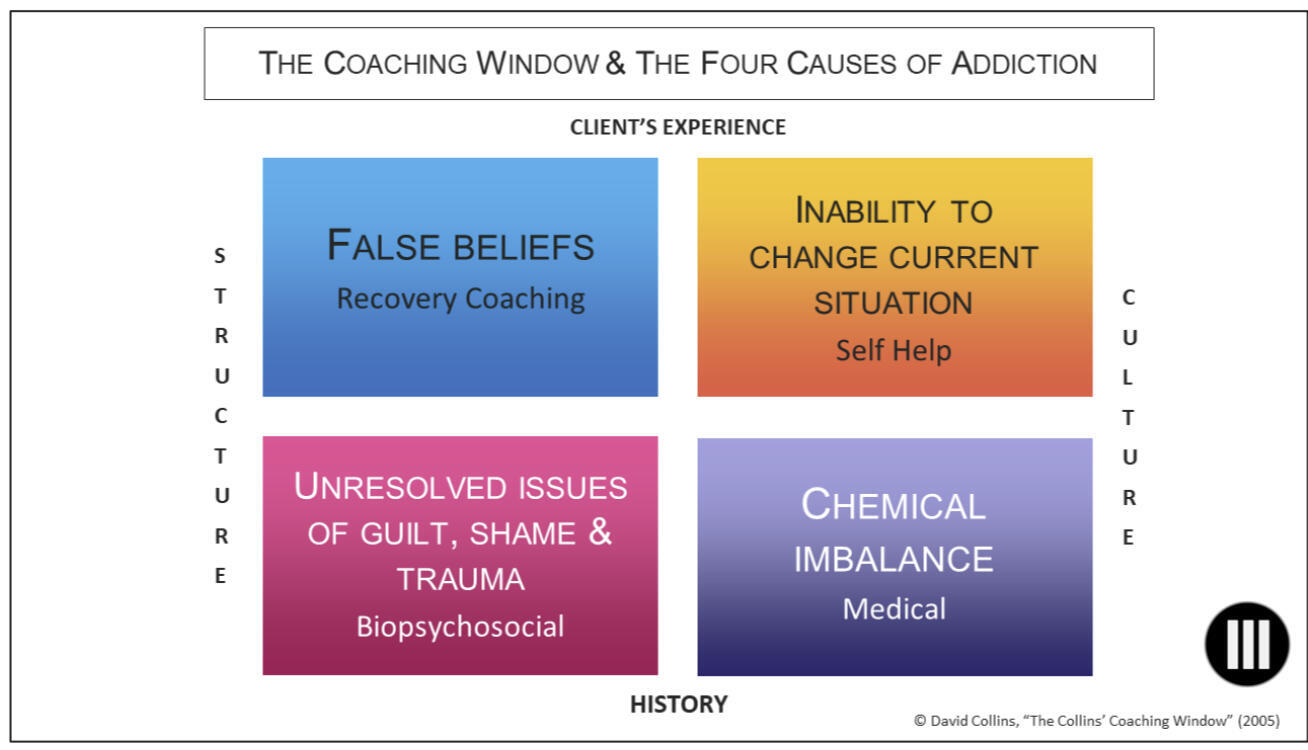
The 4 Causes of Addiction – David Collins' Meta-Model
Biological / Genetic
Includes neurochemical imbalances, genetic predisposition, and physiological responses to substances.Psychological / Emotional
Covers unresolved trauma, emotional pain, stress, low self-worth, and maladaptive coping strategies.Social / Environmental
Encompasses upbringing, culture, community context, family systems, poverty, and peer influence.Spiritual / Existential
Reflects a loss of meaning, purpose, or connection; lack of values alignment; existential despair or dislocation.Each quadrant of the model invites both coach and client into a systemic inquiry, exploring how these domains influence one another. It also guides recovery coaches in mapping supportive strategies and referrals across each area — not fixing or diagnosing, but co-creating awareness and scaffolding for sustainable change.
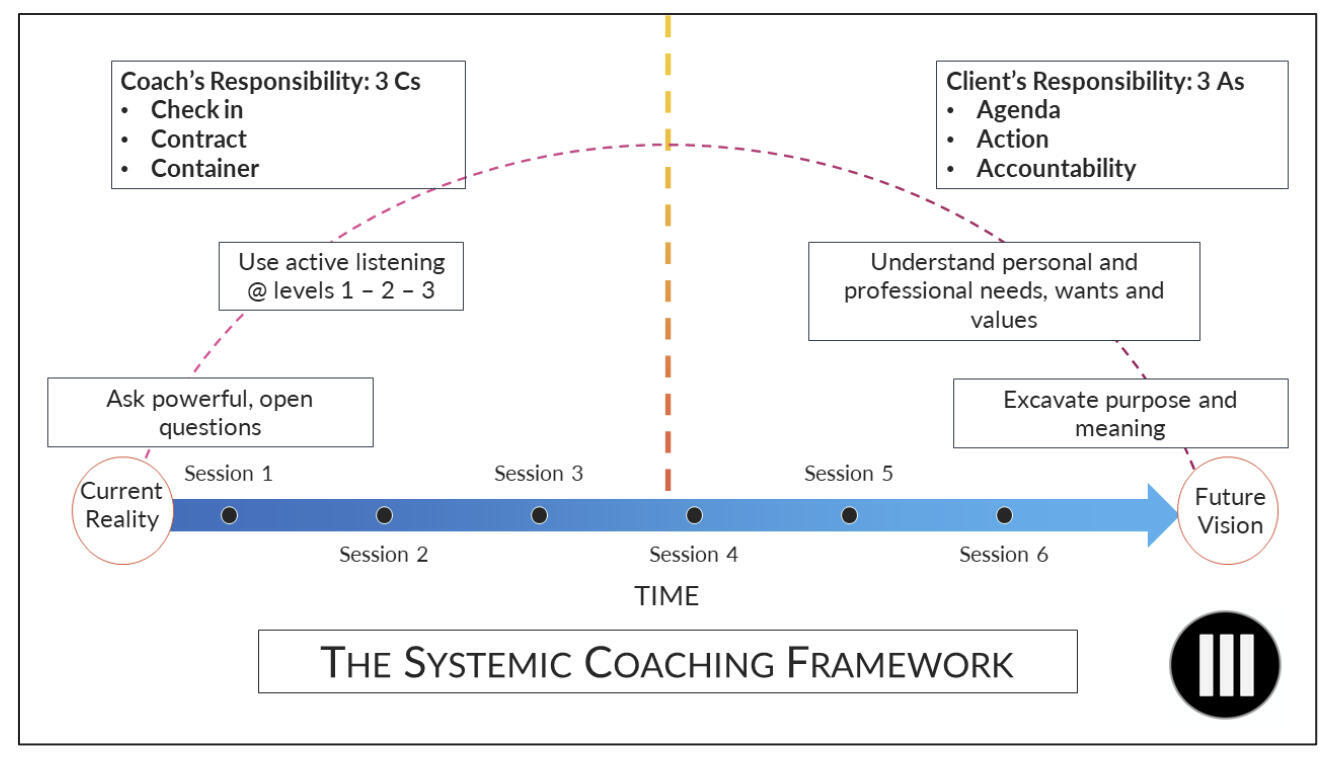
This diagram illustrates David Collins’ Systemic Coaching Framework, a key model taught in the Certified Professional Recovery Coach (CPRC) programme. It maps the arc of a coaching journey over time, from the client's current reality to their future vision, integrating both the responsibilities of the coach and the client.🔄 Core Structure: A 6-Session Framework
Left Side: Present FocusSession 1–3: The coach helps the client explore their current reality using:Powerful, open questionsActive listening (Levels 1–2–3)Building the foundation with the 3 Cs (coach's responsibility):Check-In – Emotional, cognitive, or situational orientationContract – Agreement on session focusContainer – Safe, ethical spaceMidpoint (Session 3–4): This is often where transformation begins to solidify. It's a tipping point from reflection to action.Right Side: Future FocusSession 4–6: Moves toward the client's future vision:Clarifying personal and professional needs, wants, and valuesExcavating purpose and meaningSupporting the client’s 3 As (client's responsibility):Agenda – Their chosen focusAction – Steps they commit toAccountability – Ownership of progress🔑 Why This Matters in Recovery Coaching
This model is systemic because it considers:The whole person (values, vision, triggers, strengths)The coaching container as a relational fieldThe movement across time — from past struggles to future possibilitiesIt offers a trauma-informed, strengths-based approach without slipping into diagnostic or therapeutic territory. You’ll see this structure echoed in the Recovery Wellness Programme, especially as clients begin articulating their values, confronting false beliefs, and cultivating recovery capital.
This diagram illustrates David Collins’ Systemic Coaching Framework, a key model taught in the Certified Professional Recovery Coach (CPRC) programme. It maps the arc of a coaching journey over time, from the client's current reality to their future vision, integrating both the responsibilities of the coach and the client.🔄 Core Structure: A 6-Session Framework
Left Side: Present FocusSession 1–3: The coach helps the client explore their current reality using:Powerful, open questionsActive listening (Levels 1–2–3)Building the foundation with the 3 Cs (coach's responsibility):Check-In – Emotional, cognitive, or situational orientationContract – Agreement on session focusContainer – Safe, ethical spaceMidpoint (Session 3–4): This is often where transformation begins to solidify. It's a tipping point from reflection to action.Right Side: Future FocusSession 4–6: Moves toward the client's future vision:Clarifying personal and professional needs, wants, and valuesExcavating purpose and meaningSupporting the client’s 3 As (client's responsibility):Agenda – Their chosen focusAction – Steps they commit toAccountability – Ownership of progress🔑 Why This Matters in Recovery Coaching
This model is systemic because it considers:The whole person (values, vision, triggers, strengths)The coaching container as a relational fieldThe movement across time — from past struggles to future possibilitiesIt offers a trauma-informed, strengths-based approach without slipping into diagnostic or therapeutic territory. You’ll see this structure echoed in the Recovery Wellness Programme, especially as clients begin articulating their values, confronting false beliefs, and cultivating recovery capital.
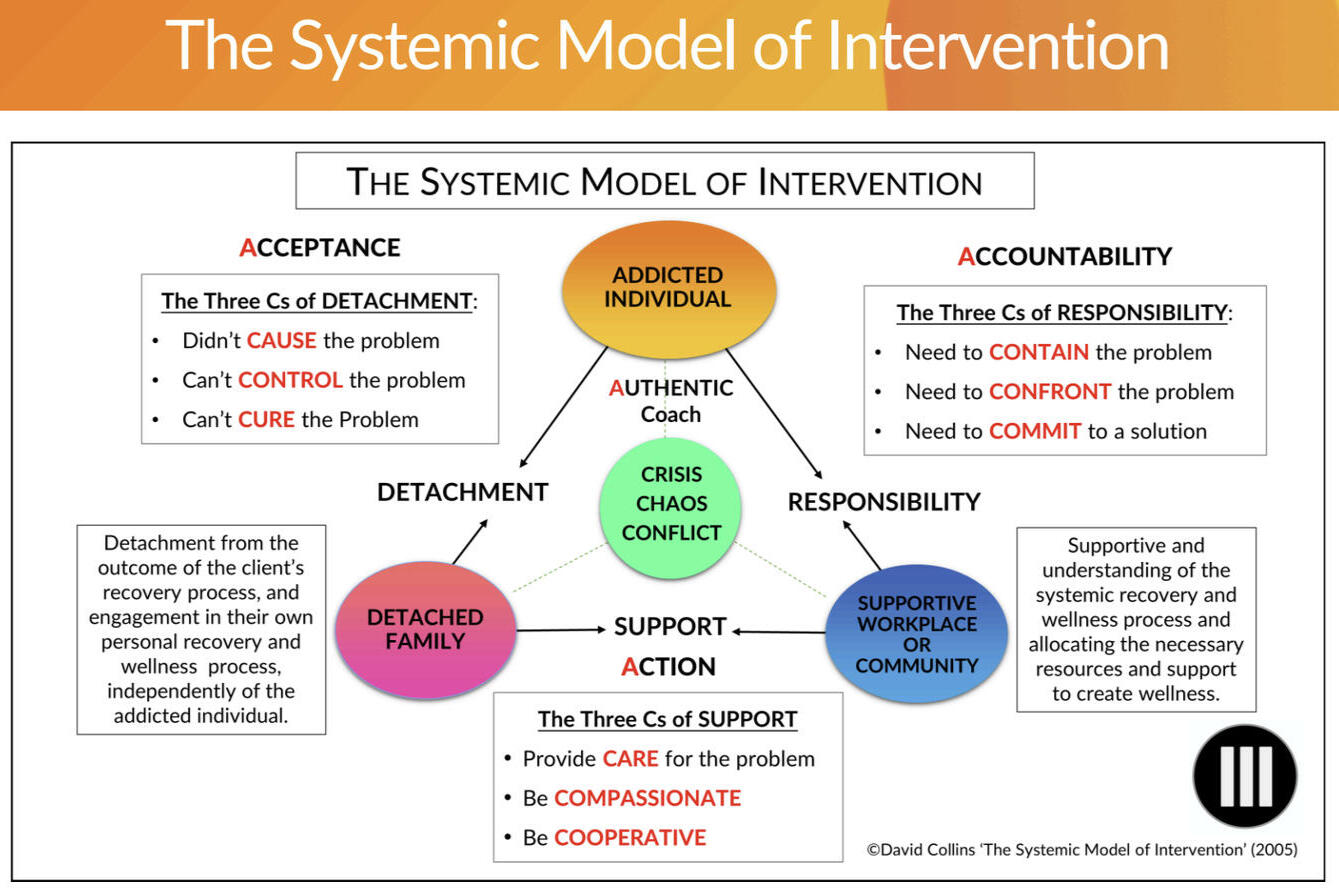
This diagram presents David Collins’ Systemic Model of Intervention, a foundational framework in the CPRC programme and Recovery Wellness work at Mauni. It’s designed to guide recovery coaches, families, and communities in understanding how to intervene systemically when addiction or crisis is present — without falling into blame, burnout, or control.🧭 Overview of the Systemic Model of Intervention
At the center is the Addicted Individual, surrounded by chaos, conflict, and crisis. The systemic model involves three key system players and their roles:🟥 1. Detached Family – Acceptance & Detachment
Embraces the Three Cs of Detachment:Didn’t Cause the problemCan’t Control the problemCan’t Cure the problemThis encourages boundaried love — stepping back from rescuing or enabling.Family focuses on their own healing and wellness, instead of becoming consumed by the addicted person’s process.🔵 2. Supportive Workplace or Community – Responsibility & Accountability
Holds the Three Cs of Responsibility:Need to Contain the problem (safe boundaries)Need to Confront the problem (name truth gently)Need to Commit to solutions (show up consistently)This includes employers, community leaders, or social systems that hold space for change without collusion or chaos.🟠 3. Authentic Coach – Support & Action
Stands as a grounded third point of stability between chaos and detachment.Anchors the Three Cs of Support:Provide CareBe CompassionateBe CooperativeThe coach models calm presence, neither avoiding nor over-identifying.🌪️ The Central Dynamic: Crisis–Chaos–Conflict
All three systems (family, coach, community) must learn to respond rather than react to the chaos surrounding the addicted individual. This triad of C's (Care, Compassion, Cooperation) offers a stabilising influence when others are in a state of trauma or reactivity.📌 Key Insight
Recovery coaching in this model does not fix or rescue — it helps build systemic scaffolding for recovery. Everyone in the system must take responsibility for their own role, and the addicted individual is invited to step into authentic choice through support, not pressure.